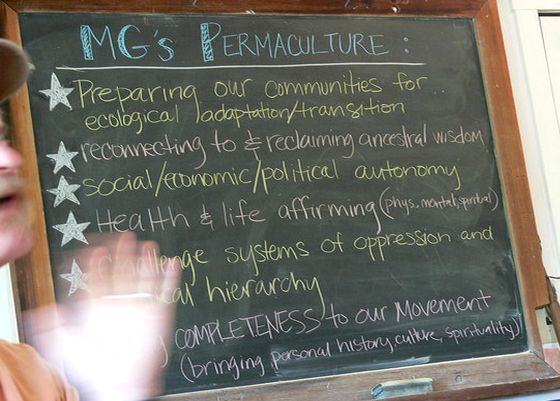Permaculture Principles
There are permaculture principles and permaculture ethics. The ethics are sometimes referred to as principles as well. I'll keep them separate.
The permaculture ethics are at the centre of permaculture philosophy and are broad guidelines of how we should behave towards the earth and towards each other.
The permaculture principles, or permaculture design principles, are the guidelines that you follow when you design a permaculture garden or bigger permaculture system.
 Though called permaculture principles here, these are ethics. Photo: planet a
Though called permaculture principles here, these are ethics. Photo: planet aPermaculture Ethics
The three ethics at the core of permaculture are quite simple and don't need much explanation:
- Care of the earth: in everyday language you probably more often hear "protect/save the environment". It means the same thing: using renewable resources, recycling, minimising waste, building up soils rather than depleting them, conserving water and so on.
Anybody who aims to do that is following that first permaculture principle or ethic. - Care of the people: this means simply to look after yourself and after others. Health and well-being are important, so are learning, a sense of belonging, communication, trust and respect.
All people should have access to what they need to live a safe and healthy life. - Fair share: it's what your mum tried to teach you many, many years ago. Only take what you need and share the rest. This permaculture ethic focusses on co-operation, networking, contributing to the community and on distributing resources and wealth.
But it also looks at reduction of consumerism and requires us to rethink our current ideas about growth and development. Sometimes this principle is written as "accepting limits to population and consumption". We can't go on consuming like we do without putting more thought into where things come from and how we can produce them sustainably, so they will still be available tomorrow.
Permaculture teaches us to observe nature, to understand our environment and so become more ecologically aware and responsible. The philosophy behind permaculture also looks at the global context, it is a big vision.
But the three ethics do not immediately convey the main focus of permaculture: the focus always was and still is on sustainable food production.
How permaculture design makes growing fruit and vegetables easier, more sustainable, reduces the work involved and produces a bigger and healthier harvest, that's what the following permaculture principles deal with.
Permaculture Design Principles
Permaculture principles are the result of the observation of natural systems. They outline how things work in nature, and how you can apply that to your design. They also tie in with the three ethics listed above.
There are as many different collections of principles as there are websites about permaculture... Permaculturists keep identifying new principles, and everybody has a different focus.
My focus is food production on a garden scale. Therefore I will focus on the principles as they apply to the average home fruit and vegetable garden. I will cover those principles in detail and give you examples how to implement them.
These are the guidelines that will form the corner stones of your garden design:
Permaculture Design Principles